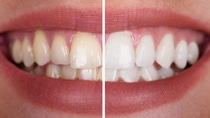Enameguard™ - A natural protein to support the natural mineral balance of the mouth
Mouthwash and toothpaste formulated with Enameguard™ gives people with acidic diets something to smile about

When life gives you lemons...
...all that lemonade can start to wear down the enamel on your teeth. (You didn’t think we were going there, did you?)
Enamel is the outer shell of our teeth. It protects teeth from everyday challenges caused by acidic food and drinks, such as citrus fruit, soda, coffee, and wine. Saliva acts as a natural buffer to these acids, but when acidity gets out of control – like when a person consumes acidic foods and beverages in excess – tooth enamel can start to wear down.
Thinning enamel increases the chance of tooth sensitivities when you eat or drink hot or cold things. It can also make your teeth look more yellow.

According to a review article* summarizing 83 clinical studies, erosion of tooth enamel is very common around the globe. That’s why BASF’s scientists have developed technologies like Enameguard™ to help support the natural mineral balance of the mouth. Enameguard™’s naturally-derived protein is shown to bind onto enamel and attract enamel-fortifying minerals in saliva to restore the mouth’s natural balance. It’s also easy to formulate into various types of oral care product formats.
To understand how Enameguard™ works, let’s take a look at the science of enamel erosion.
* Jaeggi, Thomas, and Adrian Lussi. “Prevalence, Incidence and Distribution of Erosion.” In Monographs in Oral Science, edited by A. Lussi and C. Ganss, 25:55–73. Basel: S. KARGER AG, 2014 https://doi.org/10.1159/000360973
Thinning tooth enamel: The basics
Tooth enamel is made up of rods composed almost entirely of tightly clustered crystals of hydroxyapatite (HAp). Enamel is the most mineralized part of our teeth. It guards the teeth against day-to-day changes in acidity.

Over time, exposure of the enamel surface to acidic foods and beverage causes the enamel to start to dissolve and release calcium and phosphate ions into saliva in a process called demineralization. This results in the thinning and softening of tooth enamel.
As enamel thins, it starts to expose the pale-yellow dentin underneath, which makes the teeth look yellowish. Exposed dentin also makes it more likely that hot or cold foods and beverages can cause tooth sensitivity.
Naturally remineralizing enamel
To counteract demineralization, the body has a natural balancing process called remineralization. In a nutshell, saliva contains supersaturated calcium and phosphate ions that are stabilized by salivary peptides on the enamel surface. This process controls the crystal growth of enamel, which helps the teeth regain minerals, or remineralized enamel. Though natural remineralization counteracts demineralization, this balance is easily disrupted by excessive consumption of acidic food and beverages.

Restoring the mouth’s natural balance from dietary acid disruption
When the mouth’s natural balance is thrown off, oral care products containing Enameguard™ can help restore the natural balance. As a naturally derived protein, Enameguard™ binds to the enamel surface and supports the natural mineral balance of saliva.
Remember those hydroxyapatite rods we talked about? Erosion happens when they start to dissolve; however, Enameguard™ restores the mouth’s natural balance, using its unique peptide structure to support the enamel-buffering effects of saliva. Many studies have demonstrated the enamel-binding capability and calcium interaction of Enameguard™. Data are available from BASF upon request.
Other similar technologies on the market are water-sensitive, but Enameguard™ is highly water soluble. That makes it easy to formulate into a variety of oral care product formats, including mouthwash and toothpaste.


